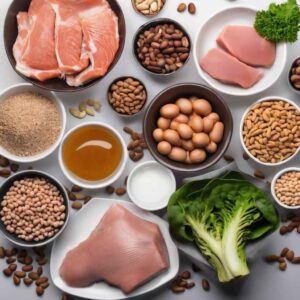How Protein Powers Muscle Growth and Speeds Up Recovery
You may have heard that protein is very important for muscle growth and muscle recovery and you would be correct. This is key during muscle and strength tissue repair, growth, and maintenance.
All athletes, weekend warriors, and health seekers must know key points about protein. It’s important. This article covers the science of protein, muscle, and strength.
It explains how it works and which types are best for muscle growth. It also gives tips on how to add bulking meals and protein to your diet for better workout results, muscle, and strength.
Protein and Muscle-building Science
Protein: The Silent Muscle Growth
Amino acids are the building blocks of life muscle and strength, in turn constituting proteins. There are 20 amino acids.
Nine are ‘essential.’ Your body can’t make them, so you must get them from food. The body digests protein into amino acids to repair and build new muscle and strength fibers.
Strength training, or any resistance exercise, creates small tears in your muscles. This then causes your body to fix the muscle growth tissue. In doing so, it makes the muscle and strength stronger and bigger.
Muscle fiber nuclei are usually called myonuclei. Myonuclei in your body use amino acids from your bulking meals diet. They synthesize new proteins through a process called muscle and strength protein synthesis (MSPS).
Muscle Protein Synthesis over Muscle Protein Breakdown
Muscle and Strength-building is a balance between muscle protein synthesis (MSPS) and breakdown (MPB). To increase muscle size, the rate of MPS must be greater than MPB.
This is where a professional understanding of dietary protein intake comes into play. When you exercise, muscles break down, triggering a surge in protein demand.
At this point, the amino acids in bulking meals protein boost synthesis. This, in turn, promotes muscle and strength growth and repair.
The Anabolic Window: Debunked?
Protein consumption after exercise sparks fast muscle growth during a short timeframe. Some studies say that eating protein 30 to 60 minutes after workouts is beneficial.
However recent research shows that the key factor is daily muscle-building nitrogen. It is not the timing right after exercise.
To boost your training and muscle growth, avoid high-protein foods and supplements right after your workout.
What Are the Different Types of Protein: What Is Best for Muscle Growth?
Whey Protein for Muscle Growth
Whey protein is the most popular and well-studied bulking meal protein supplement. The best part is that it is a complete protein for muscle and strength, so that means all nine essential amino acids are present!
Whey is a fast-digesting bulking meal protein. It is perfect for recovery after training or competition. Leucine is an important amino acid that helps with muscle and strength protein synthesis. (MSPS)
Casein Protein for Muscle Growth
Dairy contains casein protein, which breaks down at a slower rate. Casein is a slow-digesting bulking meal protein. It releases amino acids into your bloodstream over time.
That’s why casein supplements are ideal as bedtime proteins. They feed your muscles and strength all night, aiding muscle repair during rest.
Plant-Based Proteins for Muscle Growth
If you are lactose-free or prefer plant-based options, try pea protein.
Hemp and rice proteins combine to form a complete profile. Different plant sources, like rice and pea protein, provide all amino acids and bulk meal protein.
Soy protein serves as a comprehensive plant-based source for muscle and strength development. It ranks close to whey protein in muscle and strength-building potency.
Whole Food Protein Sources
Supplements are suitable. But, whole foods are the best natural protein sources. Foods like chicken, turkey, lean beef, fish, eggs, dairy, and legumes are good sources of protein. They are high-quality. They will aid muscle growth and recovery.

How to Calculate Daily Protein Needs
General Guidelines for Muscle Growth
The protein needed to build muscle and strength varies by person. It depends on age, gender, activity level, and fitness goals.
A general recommendation for those in chronic strength training is to consume 1.6–2.2 g of protein per kg of BW·day−1. For a 70 kg (154 lbs) person, that’s 112 to 154 grams of protein daily.
Protein Distribution across the Day
This applies to both the total bulking meal protein and its timing. Researchers suggest spreading protein intake evenly to build muscle and strength efficiently.
Each meal should have 20-40 grams of protein. It depends on your needs for bulking meals. Also, eat more snacks to hit your protein goals.
Older Adults
This is due to anabolic resistance. The body becomes less effective at using protein as we age. So, older adults may need more protein to build the same amount of muscle and strength they would have built in their youth.
Older adults should eat more protein (2.0–2.2 g/kg BW). They should get a good dose in each meal, prioritizing high-quality proteins for muscle and strength.
Protein and Recovery
The Role of Protein in Muscle Recovery
To strengthen, your muscles need time to recover after a tough workout. This is important. Protein provides amino acids for proper tissue repair.
Bulking meal protein speeds up healing and reduces soreness. It refuels the amino acids that your workout exhausts.
How Protein Reduces Muscle Soreness
Anyone who has done high-intensity exercise knows about Delayed Onset Muscle Soreness (DOMS). This is especially true if the exercises are new or more intense than usual. Bulking meal protein won’t prevent DOMS.
But, it helps recovery. It repairs muscles after exercise. This reduces injury intensity. Taking protein, along with other recovery strategies, can help muscle and strength.
These include staying hydrated, stretching, and getting consistent sleep. They can improve muscle recovery and reduce soreness.
Hydration / Electrolytes
Protein is one part of the equation to recover hydration. Water helps transport nutrients and removes waste. So, proper water consumption is essential for muscle recovery and muscle growth.
Also, electrolytes like sodium, potassium, and magnesium help muscles and strength. They aid muscle function and recovery.
Staying hydrated and balanced with electrolytes can improve muscle recovery. It can enhance how bulking meals proteins help your muscles and strength.
Good-to-Know Protein Nutrition Tips for Muscle Growth
1. Mentally Prepare Your Bulking Meals: Be sure you plan your bulking meals to include a solid protein source for each meal. Bulking meal prepping can help you get the right amount of protein every day throughout your cut.
2. If you can’t get enough protein from food, a protein supplement may help. Whey or plant-based powders can help prevent muscle loss.
3. Balanced Diet: Bulking meals with protein is necessary, but so are the vitamins. Eat a balanced diet. It should have fruits, vegetables, whole grains, and unsaturated fats. This will maximize your muscle and strength-building program.
4. Body Signals – be aware of the protein and adjust amounts based on how your body responds. Protein needs and preferences vary by person. You must find what suits you best for muscle and strength.
5. Consistency is Key: Both muscle and strength-building and recovery take time. They are bioprocesses. It should be a consistent inclusion, not something you think about after a workout.
Conclusion
Protein is a key macronutrient. It helps muscle and strength-building and recovers. It’s important for anyone wanting to improve in these areas.
You now understand bulking meals protein’s key role in MSPS and recovery. So, you know which proteins to eat to support your fitness goals.
Remember, the key is CONSISTENCY. These tips will help you boost your protein intake. You’ll be on track to kick-start your muscle growth and recovery!

